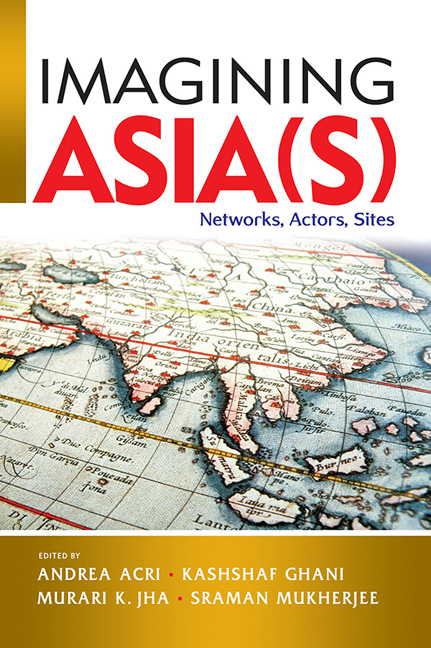Book contents
- Frontmatter
- Contents
- List of Contributors
- Introduction
- Part I Conceptualizing the Region: Past and Present
- Part II Conceptualizing Asia through the Prism of Europe
- Part III Networks of Knowledge Across the Indian Ocean
- Part IV Histories and Geographies of Pilgrimage in Asia
- Part V Trans-Local Dynamics and Intra-Asian Connections across Space and Time
- Index
Introduction
Published online by Cambridge University Press: 31 January 2020
- Frontmatter
- Contents
- List of Contributors
- Introduction
- Part I Conceptualizing the Region: Past and Present
- Part II Conceptualizing Asia through the Prism of Europe
- Part III Networks of Knowledge Across the Indian Ocean
- Part IV Histories and Geographies of Pilgrimage in Asia
- Part V Trans-Local Dynamics and Intra-Asian Connections across Space and Time
- Index
Summary
This edited volume stems from the conference “Imagining Asia(s): Networks, Actors, Sites” held at ISEAS – Yusof Ishak Institute in October 2016, jointly organized by the Nalanda-Sriwijaya Centre (Singapore) and Nalanda University (India). This event, bringing together fourteen scholars from various countries, constituted a landmark for the collaboration between the two institutions and, we believe, also a gesture towards the academic and intellectual “rapprochement” between two regions of the world—South and Southeast Asia—whose deeply connected histories have been forgotten for a long time, and need now, more than ever, to be (re)conceptualized as an integrated phenomenon. Indeed, the intellectual agenda driving this conference has been an engagement with the idea of “Asia” in the frame of Area Studies scholarship and, at the same time, a commitment to the study of Intra-Asian networks and connections that has been the hallmark of recent scholarship, including the very series in which this volume has been published.
Asia has long been perceived as a clear and distinct geographical unit. As a continent lying to the east of Europe, it has been malleable to different imaginations and politics. Area studies scholarship, for example, has carved Asia into the seemingly self-contained regions of West and Central Asia, South and Southeast Asia, and East Asia. These regional configurations reflect more the changing (geo)political and economic interests in these areas rather than any of their historical or cultural roots. Recent scholarship, however, has presented Asia as a cultural entity produced through political imaginations located in specific historical contexts, and revealed the arbitrariness of the Area Studies divide. More importantly, it has advanced the question as to what Asia is, and as to whether there existed one or many Asia(s).
Following the lead of such scholarship, this conference sought to explore Asian societies as interconnected formations through trajectories/ networks of circulation of people, ideas, and objects in the longue durée. Moving beyond the divides of conventional Area Studies scholarship and the arbitrary borders set by late colonial empires and the rise of postcolonial nation-states, this conference mapped critically the configuration of contact zones in which mobile bodies, minds, and cultures interact to foster new images, identities, and imaginations of Asia.
- Type
- Chapter
- Information
- Imagining Asia(s)Networks, Actors, Sites, pp. 1 - 14Publisher: ISEAS–Yusof Ishak InstitutePrint publication year: 2019

